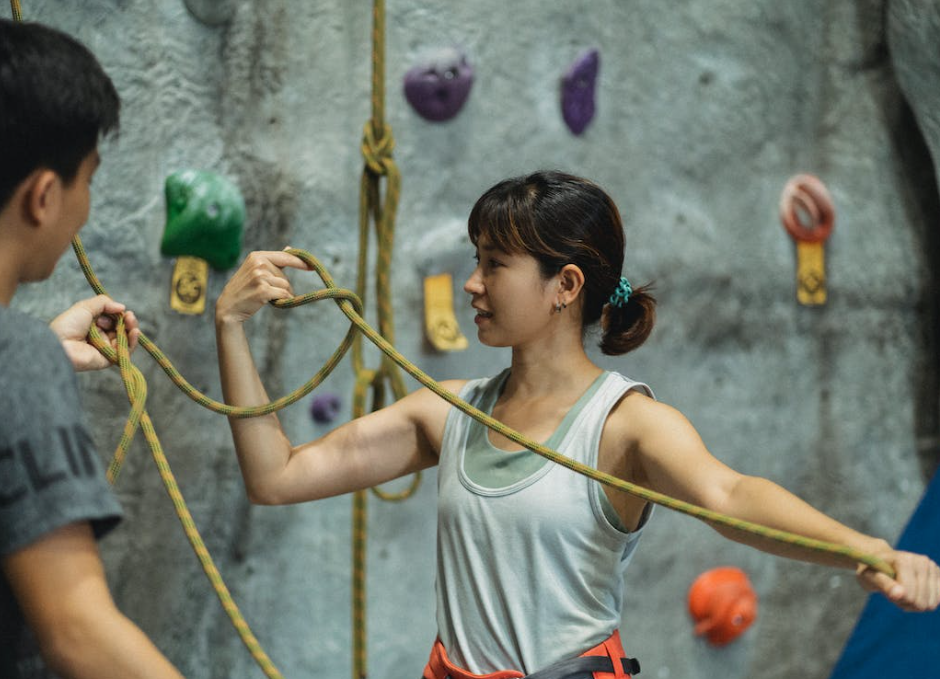What Is Self Talk in Sport?
Learn about sports self-talk and how to improve athletic performance..

Selfpause Affirmation App
Download the app to get 1,000’s of affirmation meditations and everything you need to write, record and listen to your own.
Motivational self-talk is a psychological skill that can be used to improve athletic performance. It has several benefits, including improved mood, self-efficacy, and persistence. It may be most effective in sports where the performance is open-ended or where a variety of factors are involved. This includes team-based sports such as hockey and football, as well as individual sports like surfing.
Using self-talk to enhance performance is a good way to develop your passion for the game. In other words, you can choose a phrase that captures your passion and the way you talk to yourself. This is like your own personal pep talk. Once you find a phrase that is meaningful to you, try to repeat it to yourself often.
Researchers have found that using self-talk to improve sports performance can reduce internal distractions. Researchers have found that the use of specific cue words can make athletes more aware of their goals and reduce the amount of time spent on task-irrelevant thoughts. These distractions can hurt sport performance, but self-talk can help prevent this from happening.
Previous research on the effects of motivational self-talk in sports has focused on elite athletes and the psychological approaches they employ to enhance their performance. These studies have also examined the effects of self-talk on emotions and behavior. They have shown that positive self-talk can promote positive emotions, task engagement, and application of effort.
The benefits of using motivational self-talk in sport are well known. It has even been shown to improve accuracy and strength in tennis net volleys. Moreover, it can help you maintain good form and remember your training sessions. It is an important tool for improving performance. If you’re serious about winning your next match, use motivational self-talk to improve your chances of success.
A major part of self-talk research has focused on categorization. Researchers have created taxonomies for the different types of self-talk, which facilitate a more complex understanding and improved interventions.
Instructional self-talk

Instructional self-talk can facilitate and direct human performance in a variety of settings, including sport. In one meta-analytic review of 32 studies, self-talk interventions were found to have moderately positive effects on task performance in sport. These interventions were most effective when participants were performing a novel task or were faced with competing with others.
This strategy is commonly used by athletes to manage pressure and worry. It can also be used as a way to maintain focus and self-control. In some cases, self-talk can even prevent an athlete from giving up the sport altogether. However, this technique must be used carefully. If done incorrectly, it can undermine personal empowerment and lead to a lack of engagement with task performance.
The use of self-talk can affect athletes’ performance in different ways, with each type influencing task execution differently. Instructional self-talk can enhance concentration, and can assist athletes in paying attention to specific cues that are relevant to the task at hand. It should be used with caution in sports where precision and technique are key components. In addition, it can be used to prepare athletes for competition by building confidence.
Instructional self-talk can also influence motivation and performance. Positive self-talk reinforces ability, choice, and performance, while negative self-talk increases pressure. In addition, self-talk can improve performance by improving precision and accuracy. A study of self-talk in sport has shown that it can help athletes improve their performance by as much as 15%.
The study also found that ST interventions improved the ability of athletes to set and follow goals. The effect of instruction on athletic performance was significant in the intervention group, whereas the control group remained stagnant, losing self-optimization skills. Despite the positive effects, the findings are not conclusive.
Goal-directed self-talk

Goal-directed self-talk can regulate and reconstruct cognitions. It can control activation and deactivation, and can promote positive attitudes. Specifically, goal-directed self-talk may lead to improved performance. Goal-directed self-talk can enhance a person’s performance and decrease fatigue.
A single-case study of an athlete who engaged in goal-directed self-talk explored the effects of the intervention. The 36-year-old elite orienteer engaged in six sessions of self-dialogue. The participant was able to identify and challenge problematic sport situations, and she appreciated the process. The study provides preliminary evidence that goal-directed ST interventions can help athletes improve their performance.
While goal-directed self-talk is widespread in sports settings, the effects of this type of self-talk are not yet well understood. There are also differences between male and female elite athletes. Researchers have found that self-talk used on team-based and individual-sport athletes produce different results. Moreover, the use of technical devices during competitions may present obstacles for athletes. In addition, goal-directed self-talk in sport can help athletes stay mentally stable during competition.
When practicing goal-directed self-talk in sport, athletes should focus on the end result they want to achieve. This way, they can focus on their performance and avoid distractions. Positive self-talk can also help athletes avoid negative self-talk and stay focused. This can lead to better performance and avoid injuries.
Self-directed self-talk is important for an athlete’s performance and can improve confidence. Coaches can teach athletes how to practice positive self-talk to improve their confidence and adapt to competition. However, it will take time for athletes to develop a habit of using goal-directed self-talk.
System 2 self-talk

In sports, self-talk is often used to help athletes perform better. The type of self-talk an athlete uses can vary based on their motivation, self-esteem, skill level, context, and previous experience. The theory of dual processes suggests that many thoughts are generated by two different types of systems. In sport, self-talk can be useful for boosting motivation, performance, and overall mental health.
The research reveals that self-talk is an important factor in performance, including skill acquisition and maintenance. It is also crucial in facilitating physical skill execution. Specifically, task-relevant self-talk has been shown to improve athletic performance, especially in sports where the athlete is competing against other people and performing at high levels of intensity.
While sports psychologists are increasingly aware of the importance of self-talk in sports, there is still no comprehensive model of this phenomenon. The aim of this paper is to review the research and propose a sport-specific self-talk model that incorporates existing theory and addresses key questions regarding the effectiveness of self-talk in sport.
Recent research has proven that positive self-talk can improve performance and motivation. In particular, it has been found to improve physical feelings of strength and self-efficacy. A study conducted by Slimani and Cheour (2016) found that combat sport participants who practice pre-motivational self-talk during strength training or counter-movements experienced enhanced performance. Similarly, a study by Murphy & Malouff found that positive self-talk during golf improves putting performance and overall satisfaction during and after play.
The results of the study show that positive self-talk helps athletes improve endurance, strength, precision performance, and control of arousal. Moreover, it improves concentration, focus, and learning skills. Additionally, self-talk during competition has been linked to increased confidence. In sports, positive self-talk improves confidence and concentration, which is critical to achieving optimal results.
Our Top FAQ's
Self-talk is the internal dialogue that athletes have with themselves. It can have a significant impact on their performance in sport, as it can influence their confidence, motivation, and focus. Research has shown that positive self-talk can help athletes increase their confidence, stay motivated, and maintain their focus, which can ultimately lead to improved performance. Negative self-talk, on the other hand, can have the opposite effect, leading to decreased confidence and motivation, and possibly even performance decrements.
There are several types of self-talk that athletes may use. Some common types of self-talk include instructional self-talk, which involves providing oneself with specific instructions or cues to execute a task; motivational self-talk, which involves reinforcing one’s confidence and motivation; and soothing self-talk, which involves calming oneself down and managing negative emotions.
Self-talk can be both positive and negative. Positive self-talk involves talking to oneself in a way that is supportive and encouraging, while negative self-talk involves talking to oneself in a way that is critical or self-defeating. The content of self-talk can have a significant impact on an athlete’s performance. Research has shown that positive self-talk can lead to increased confidence and motivation, which can ultimately lead to improved performance, while negative self-talk can have the opposite effect.
Athletes can use self-talk to manage their emotions and stay focused during competition. For example, they might use soothing self-talk to calm themselves down and manage anxiety or negative emotions, or use instructional self-talk to provide themselves with specific cues and instructions to execute a task. Using self-talk effectively can help athletes maintain a positive mindset and stay focused on the task at hand, which can ultimately lead to improved performance.
Coaches and trainers can help athletes develop effective self-talk strategies by teaching them how to identify and challenge negative self-talk, and replace it with positive self-talk. They can also teach athletes how to use different types of self-talk, such as instructional or motivational self-talk, to help them stay focused and motivated during competition. It may be helpful for coaches and trainers to model effective self-talk strategies and provide opportunities for athletes to practice using self-talk in training and competition.
